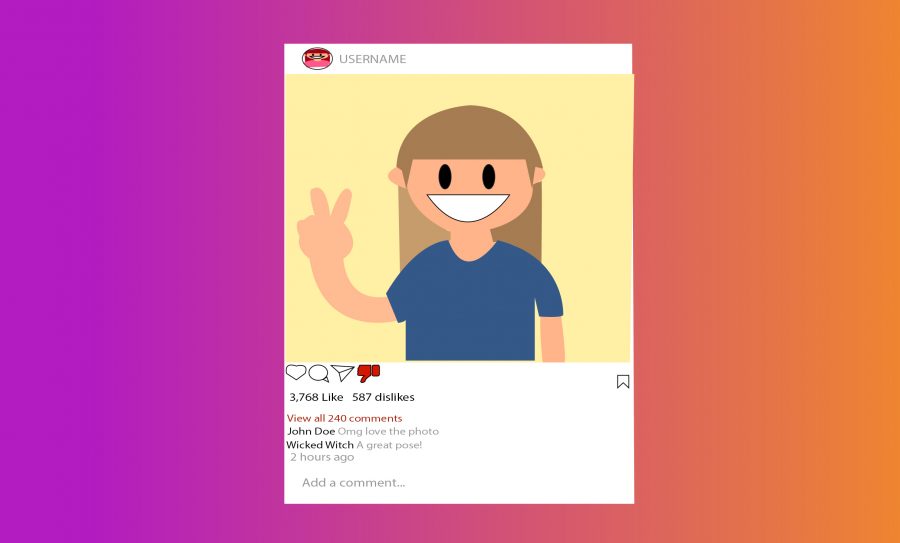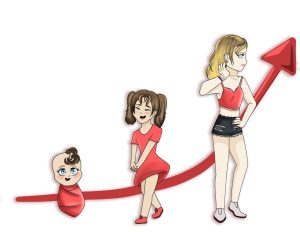Social media should not include a dislike button option
March 2, 2020
Everyone has their own opinion and is entitled to it, whether it’s positive or negative. It has recently become simple for people to share their opinions via social media with the creation of social media platforms such as Twitter, Facebook and Instagram.
There are several ways for users to react to posts on social media. Whether it is a thumbs up or a heart, “liking” illustrates that someone has enjoyed a post or agrees with it. However, there are times when someone disagrees with the post. There is no way for someone who disagrees with a post to “dislike.” Enabling social media platform users to use a dislike button would have many negative consequences, such as enforcing negative opinions, which is why it should not be an option.
Based on research from several websites, younger generations continuously strive for more likes and comments on their posts, which can ultimately build up or break down their self-esteem. People enjoy being accepted and loved, so if a large number of people knock a user down with dislikes, this can have negative impacts on their mental health. With this being said, people may also change themselves, such as dying their hair a different color or buying new clothes due to opinions given to them through social media.
However, people are intended to their first amendment rights to the freedom of speech, so they are fully able to post whatever they please on their social media accounts. Along with this, the dislike button would give people an opportunity to shut down offending or inappropriate posts, which would have a positive effect on the users of social media, whether it is on Facebook or Instagram. This is just one of the few reasons why dislike buttons should be allowed, but in reality, dislike buttons would be beneficial to social media users.
The dislike button would sometimes be used purposely to put people down and the constant dislike will begin to have negative effects on people, including self-esteem issues, changing of personal choices, and even unneeded drama, whether it is intentional or not. Oftentimes, people believe everything written on the internet is true, so if they are told they are not good enough, then they may believe it.
Social media is full of platforms where people are able to speak their minds and stand up for what they believe in, for example being express their views for the world through several platforms such as Twitter and Instagram, whether others agree with them or not. However, if a dislike button was introduced, people would be bashed for their opinions even though they are not doing anything wrong by posting on their own personal accounts.
Adding a dislike button would create unnecessary conflict. As there are already so many disagreements throughout our world, social media should not become increasingly hostile. These platforms should be used as a way for users together, bring their spirits up and learn new things about the world.











Miguel Collado • Jan 12, 2024 at 3:02 pm
This is so wrong. New generations are already emotionally affected in a very negative way with this new way to build relationships and friends named social media, even using hearts and likes emojis they are not well. People needs to socialized in a real way. One on one, taking a ride together, having a coffee together… talking, dancing, hanging around. This is going worst. I AM TOTALLY DIAAGREED WITH THIS NOTE AND DISLIKE IT
Josh • Mar 27, 2023 at 3:50 pm
So here’s the thing. Sometimes people feel the NEED to express their opinion online. If you disagree with what someone has commented or posted, you should absolutely be able to dislike it. And before you stop reading, let me ask you, is it better to have a negative comment on a post or a dislike? I’d prefer the latter. Imaging if someone was thinking “I don’t like this post because this person is fat.” And they really want to share their opinion. Well, they have 2 options, comment and express yourself with no consequences whatsoever, or just keep scrolling and keep that pent up anger inside of you. Many people would comment their hate which does not support positivity in any way. I actually see FAR MORE negative comments than positive comments, and this has been the trend for quite some time. With a dislike button, imagine how many less negative comments you would fucking see. Like, it boggles my mind how people don’t understand that by simply adding a dislike button you are giving toxic people an option to dislike as opposed to forcing them to comment their negativity. Fucks sake. Lmk if you agree
Ap • Nov 2, 2022 at 12:04 pm
Its fake to pretend like we should “like” everything. I support a dislike button as a way to say: No! Unacceptable! I disagree and that is wrong. There is an angry face available, so its ok to be angry… but you have NO option to dislike.
Michael • Jan 30, 2022 at 7:44 am
You are arguing that a simple “dislike” is more hurtful/damaging than someone’s written negative comments, which may even be nasty comments because they could not simply hit dislike and move on. Total crap! BIG THUMBS DOWN on this opinion.
Randy • Jun 23, 2021 at 7:59 am
If someone is going to be devastated by a “dislike” on Social Media, then, they need to get off it. Young, old, whatever, if your life and happiness are based on what everyone thinks of your posts, then it’s their issue, not mine. Making all the features of a media app be positive only, just invites negativity. If people can get out what they are not liking, it would help. Let me just say, you allow politics, but, you don’t want negativity? LMAO,
Toon_crazy • Mar 21, 2021 at 1:20 pm
I am in full support of this idea. I am very hesitant to enter any social media that features a dislike button.
Young and old alike the challenges of self esteem issues on social media are very real. So if someone starts getting more dislikes then likes it would absolutely devastate them, when in actuality they are just chilling by themselves in their quiet little corner.
People are obsessing over wanting to express their disapproval, well that happens already. You can see how many views something has and compare that to how many likes, and you have a fair assessment of people’s approval. The dislike button would be used by trolls to target the vulnerable!
Imagine someone with a disability posting on social media. They get seen by 200 people; 5 people like them. They may feel bad, but they may also feel good that 5 people clapped them on. Now imagine that same person got 5 likes and 195 dislikes… now they’re at risk of suicide.
Josh • Mar 27, 2023 at 3:59 pm
I’d like to say that your disability example is a bit far fetched. I don’t think the human race is THAT negative where 195 out of 200 of us would dislike a post of a kid with a disability. You have to be realistic with this kind of stuff. So let’s be more realistic and say that 20 out of 200 people disliked this kid’s post. Okay, 180 people still liked it, so I don’t think he’s been put in the mentality to kill himself. Now let’s imagine that there is no dislike button. There are still 20 people who don’t like the video. How would they express their hate? It’s pretty self-explanatory….. the problem lies with comments. You see, comments not only allow people to say I DO like this or I DON’T like that, but they allow people to say WHY. And that generally doesn’t end well when someone has no consequences whatsoever for what they post online when they don’t like a video.
Shamveel • Oct 23, 2020 at 9:01 am
Like or dislike on Twitter or Facebook will determine what society wants.
Suppose, if a bad thing is liked in society by small group, but same is disliked by the majority of in that society and what majority think is just and right, then what happens. On the basis of likes, can you say that what society wants … ? the answer would be no.
Further, no one would be reading all the comments against such opinion, so how to determine what matters.
Not every thing can be decided by generating pool.
Jimmy • Oct 17, 2020 at 4:09 am
Very flimsy and weak rationale. This article should have a dislike button.
Terry Cosgrove • Oct 1, 2020 at 2:06 pm
what absolute rubbish, if you disagree with something something you should be able to say so
Josh • Mar 27, 2023 at 4:03 pm
I mean not only that you can say so by commenting. So that’s a problem. I’d propose to get rid of comments OR add a dislike button. I do not think that dislike button and comments should be together UNLESS you can dislike comments and only like posts.
Terry Cosgrove • Oct 1, 2020 at 1:51 pm
everything needs to be equalised. if you disagree with something you should be able to express your opinion
John Doe • Aug 17, 2020 at 1:28 am
This editorial needs a dislike button.
Krystal • Aug 8, 2020 at 6:33 am
I completely disagree with you, and I feel that opinion matters. You apparently, do not.
nat • Mar 2, 2021 at 4:42 pm
ya but this is her opinion
Shill Stopper • Mar 12, 2021 at 1:14 pm
but her opinion is to mute the opinion of others